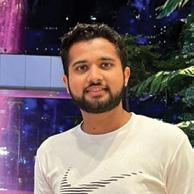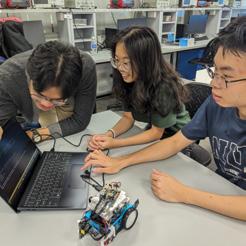SECOND MAJOR / MINOR
Career Options
• AI/Data Engineer
• Biomechanics Engineer
• Computational Materials Engineer
• Computational Mechanics Engineer
• Computer Hardware Engineer
• Design Technologist
• Digital Architect
• Digital Manufacturing Engineer
• Games Developer
• Process Optimisation Engineer
• Robotics/Automation Engineer
• Software Engineer
• Smart Building Designer
• UI/UX Designer
• Verification & Validation Engineer
• Virtual/Augmented Reality Architect
Student Learning Outcomes
(Design and Engineering)
Deepening Computing Skills Computing
To prepare the next generation of designers and engineers, the second major/minor in Computing (Design and Engineering) aims to equip students with interdisciplinary knowledge and skills. Since computing now permeates all aspects of our lives, this programme ensures that students remain at the forefront of advancements in design and engineering, enhancing a student’s career prospects. Students will learn fundamental computing concepts, analyse complex problems, use computing-based tools, and apply crossdisciplinary techniques to design solutions via digitisation and automation.
The second major/minor in Computing (D&E) includes a computer science-based core and an extensive basket of applied electives through which students can customise their learning to suit their interests and career aspirations. This will enable students to:
• Understand fundamental computing concepts and the underlying components that are required for the operation of computing systems.
• Analyse complex problems and use computing-based tools and techniques to find solutions to these problems.
• Apply cross-disciplinary tools and techniques to the analysis and design of practical strategies for digitisation and automation.
• Evaluate emerging technologies in computing and their potential impact on society and industry.
• Gain critical thinking, perspective sharing and collaboration skills.
Profiles of Alumni
(Who had taken Computing-related Courses)
Abdulhusein Jabir
Poonawala
Bachelor of Engineering (Mechanical Engineering), Class of 2021
Founder, MaajTek Pte Ltd
“My journey at NUS, where I pursued a Mechanical Engineering degree alongside Computer Science courses, has been transformative. This unique combination gave me a competitive edge in the industry by merging complex system design with automation and intelligent programming. These skills formed the foundation of my startup, MaajTek, which delivers cutting-edge solutions, from automation to industrial IoT, across Southeast Asia, India, and the Middle East. My academic experience has shown me the value of interdisciplinary knowledge, helping me stay ahead in the dynamic engineering field. I highly encourage aspiring engineers to integrate computing into their studies, as it opens up many opportunities and valuable skill sets in today’s world.”
Joseph Cheng
Bachelor of Engineering (Biomedical Engineering), Class of 2023
Research Assistant, The N.1 Institute for Health
“As a researcher at the N.1 Institute for Health working on a Systems/Computational Neuroscience project, I rely heavily on programming to analyse large volumes of neural data. Data analysis and mathematical computations essential to engineering and research are nearly impossible without computational tools.
Computational thinking enables us to offload tedious tasks to machines for fast and accurate results. While AI tools like ChatGPT are increasingly popular for their capabilities, they are fundamentally built on welldesigned algorithms and scripts. Thus, computing and programming skills will remain vital even as AI continues to evolve.”
Jody Zou
Bachelor of Engineering (Electrical Engineering), Class of 2022
Software Engineer, Visa
“Computing operates at an abstraction level that addresses the opportunities and challenges of the 21st century. Through computing courses, I built on my Electrical Engineering foundation, gaining valuable concepts and skills. This exposure to both fields provided a holistic learning experience, broadening my perspective and deepening my appreciation of various technologies. It also opened up a wide range of career opportunities, enabling me to pursue a purposeful and rewarding path after graduation.”
Eligibility
The second major/minor in Computing (D&E) is open to students reading any Design and Engineering primary major except Computer Engineering, provided they are not taking a second major or minor in Computer Science.
Students may apply at the point of admission, where the selection is based on their university admission score and/or their proficiency in mathematics. “In-flight” (i.e., current) CDE students may also apply for this second major/minor.
FAQ
What is the difference between CDE’s second major/minor in Computing (D&E) versus SoC’s second major/minor in Computer Science?
The core of the two programmes may seem similar, but the second major/minor in Computing (D&E), offered by CDE, focuses on skillsets for solving design and engineering problems. This ensures that students are equipped not only with the tools and techniques for computing but also with exposure to solving complex engineering and design problems in the industry. This focus is further reflected in the choice of computing-related electives, which are drawn from a wide range of discipline-relevant electives across the CDE curriculum.
What is the difference between a second major/minor in Computing (D&E) versus a Computer Engineering degree?
The Computer Engineering degree is explicitly designed (built from the ground up) for systems involving close hardware-software interaction and cyber-physical systems. The second major/minor in Computing (D&E), on the other hand, enhances essential computing skills for design, engineering, and innovation.
For more information and FAQs, please scan this QR code







